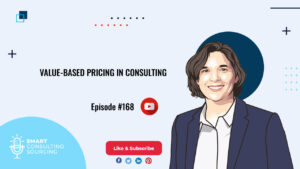Hello and welcome to episode 59 of our podcast: Smart Consulting Sourcing, THE podcast about Consulting Procurement.
My name is Hélène, and I’ll be your host today.
Each week I’ll give you the keys to better use, manage and source consulting services.
This week, I’ll explain why you should put consultants in competition
Last week, I gave you my tips to build positive relationships with your consulting firms.
We saw that since consulting is a human-to-human service, the quality of your relationship with your consulting partners will directly affect the results of your projects.
Putting the consultants in the right conditions to work, managing the project closely, and measuring performance are crucial steps to capture the right value from a consulting assignment.
But today, I am going to talk about putting consultants in competition.
As an executive, you’re probably used to making quick decisions. Given the amount of work that you have to do, you can’t afford to dither.
It means that you may not always have the luxury of time to get a variety of perspectives before making each decision. However, when you’re hiring a consultant, it might be a good idea to take your time.
When you are clear on your priorities and why you need to hire a consultant, you can start looking for the best fit for your specific project and your organization. Of course, the easiest solution is to look into your pool of existing providers and choose to pick from them.
Competition in consulting can get you the best fit
However, the best consultant for one project is not necessarily the best for the next one. Besides, you may want to introduce some competition.
Of course, It’s necessary to find a consultant with solid experience, creative problem-solving skills, and great interpersonal skills. But how are you going to know the extent to which someone has these skills unless you have someone else to compare them to?
Let’s say you meet one consultant who impresses you with his impromptu pitch. You might be tempted to choose him, just so that you don’t have to meet with several different consultants, listen to their pitches, too, and read their proposals. After all, this will mean a lot of work for you.
However, if you do all this work, you may find that different consultants have different strengths. For example, one might have great interpersonal skills, while another might have many more years of experience.
One might be endlessly creative and great with design, while another might be a lot more blunt and honest about what’s really needed for your organization. A good way of identifying strengths and weaknesses is also to check references on prior similar assignments.
At this point, you’ll be better able to decide what’s more important to you. For some executives, the experience might be most impressive, while others might value creativity above all else.
For those who have a hard time making people understand exactly what they need, interpersonal skills might be paramount. Then, when you put consultants in competition, you’re more likely to find one with the exact qualities you’re looking for.
When executives outsource a task, they might already have certain ideas about how they want the task to be performed. But when you describe your functional needs and leave room for creativity in the proposed solutions, you get various perspectives.
And you’re bound to come across some ideas you hadn’t thought of before. In fact, this is why people emphasize diversity in the workplace. When people from different backgrounds work together, they all tend to be more creative and develop new ideas.
Let’s assume, for example, that you’re trying to change your company culture and make your business one of the best places to work for employees. One consultant might suggest that you offer employees small perks such as tickets to sports events.
Another consultant might suggest that you change your interiors so that they are more conducive to productivity. A third might suggest that you dismantle the hierarchical structure of your organization.
Competition in consulting can get you new ideas
When you put consultants in competition, you’re likely to get more ideas you had never thought of before. These might shed new light on the tasks you’re trying to outsource and how they should be done. Even if you don’t adopt all the ideas you come across, it can help you to at least consider them.
Many people in business believe that they should set their personal feelings aside and work purely from a logical, rational place. However, every company has its own culture.
So when you hire people to join your business, you want them to understand it and work with your teams towards a common goal. It will be most harmoniously done if their values align with yours.
There are many consultants out there, and it’s quite likely that they’re all good ones. However, this doesn’t mean that they’re going to be right for you. In order to have a good working relationship with a consultant, his advice has to feel right to you.
And you need to feel like the consultant you’re working with gets you. You ought to feel like he’s treating you as a partner, and not just trying to impress you with everything he can do.
In this dog-eat-dog world, honesty is important. And if you can find a consultant who can tell it like it is, you’ve found a rare creature whom you should hold on to!
Competition in consulting can get you great prices
Last but not least, there is a price advantage to put consultants in competition. If the consultants know that you will examine other offers, they will give their best efforts to design and price their proposal.
Of course, you could always argue that you will take the best for the job regardless of the price, but we all know what pressure on expenses the executives have to live with, especially operating expenses.
And therefore, the better the cost for value trade-off will be, the easier it will be to convince your boss or your board that this consultant is the right choice.
And organizing a healthy competition is not as complex as one could think.
Identify the project’s scope and budget. Create a Request for Proposal (RFP) to formalize your expectations of the project.
Short-list and brief potential providers. Examine the proposals and set up face-to-face meetings with the most promising ones. Choose your preferred vendor based on a balanced range of criteria.
It’s a good idea to evaluate several consultants by putting them in competition. It will enable you to make an informed choice on what consultant is right for you on many levels, such as skills, fit, and price.
Along the way, you may even go for ideas that are completely out the box you had yourself designed in your request for proposal.
That’s it for today. Next time, I’ll explain how to find the right consultants for a project.
In the meantime, if you have any questions, or want to learn more about what we do at consulting quest, just send me an email at helene.laffitte@consultingquest.com
You can also have a look at our website smartconsultingsourcing.com to know more about our book and download free templates & guides to improve your consulting sourcing.
Bye and see you next week! Au revoir!
Competition in consulting. Competition in consulting. Competition in consulting. Competition in consulting. Competition in consulting. Competition in consulting. Competition in consulting.







